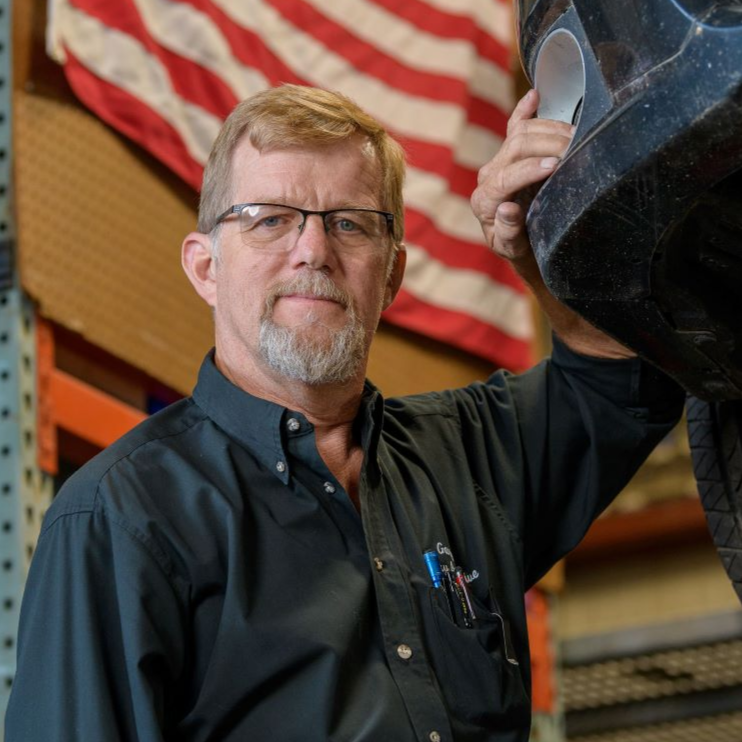If you are still planning your summer road trip, you will want to be sure that your tires have the proper “psi” (pounds per square inch). Automobile manufacturers are required to list the original air pressure in your vehicle’s manual. If the inflated pressure has consistently varied from the manufacturer’s recommendation, it's likely that the wear and tear on your tires have been accelerated and a tire repair will become necessary sooner than expected! Your auto mechanic can help you determine the remaining life expectancy of your tires before you take off down the road.
There are usually three major problems leading to tire repair:
- Under-inflation -- If tires are under-inflated by only 6 psi it could lead to tire failure. Tread life could be reduced by as much as 25%. Lower inflation allows the tire to deflect (bend) more as it rolls, which builds up internal heat, increases rolling resistance, and causes a reduction in fuel economy of up to 5%. You will also find a significant loss of steering precision and cornering stability.
- Over-inflation -- If tires are overinflated by 6 psi, they can be easily damaged when running over potholes or debris in the road. Higher inflation cannot isolate road irregularities very well and causes the ride to feel stiff and harsh. However, higher inflation will provide improvement in steering response and cornering stability, but only up to a point. Be sure to avoid intentional over-inflation.
- Time and Temperature – Time and temperature will cause inflation pressures to change. A loss of about 1 psi per month is due to air escaping through the rubber as it stretches. Inflation pressures also fluctuate with changes in the outside air temperature at a rate of about 1 psi for every 10°F (plus or minus). The inflation pressure you set correctly with an 80°F ambient temperature will be under-inflated by 6 psi at 20°F.
Remember: Be sure to check the air pressure about once a week, preferably before the vehicle has been driven. Spending about two minutes a week will achieve optimum performance and can prevent you from being stranded on the side of the road.
Need quality tire repair? Our professional auto mechanics at Gary’s Quality Automotive can help you stay safely moving down the road. Contact our ASE-Certified Technicians by calling (308) 381-2295 or go on-line at https://www.garysautoinc.com/ for more information. Our auto shop proudly serves vehicle owners in Grand Island, NE, Wood River, NE, and Doniphan, NE.
If you are still planning your summer road trip, you will want to be sure that your tires have the proper “psi” (pounds per square inch). Automobile manufacturers are required to list the original air pressure in your vehicle’s manual. If the inflated pressure has consistently varied from the manufacturer’s recommendation, it's likely that the wear and tear on your tires have been accelerated and a tire repair will become necessary sooner than expected! Your auto mechanic can help you determine the remaining life expectancy of your tires before you take off down the road.
There are usually three major problems leading to tire repair:
- Under-inflation -- If tires are under-inflated by only 6 psi it could lead to tire failure. Tread life could be reduced by as much as 25%. Lower inflation allows the tire to deflect (bend) more as it rolls, which builds up internal heat, increases rolling resistance, and causes a reduction in fuel economy of up to 5%. You will also find a significant loss of steering precision and cornering stability.
- Over-inflation -- If tires are overinflated by 6 psi, they can be easily damaged when running over potholes or debris in the road. Higher inflation cannot isolate road irregularities very well and causes the ride to feel stiff and harsh. However, higher inflation will provide improvement in steering response and cornering stability, but only up to a point. Be sure to avoid intentional over-inflation.
- Time and Temperature – Time and temperature will cause inflation pressures to change. A loss of about 1 psi per month is due to air escaping through the rubber as it stretches. Inflation pressures also fluctuate with changes in the outside air temperature at a rate of about 1 psi for every 10°F (plus or minus). The inflation pressure you set correctly with an 80°F ambient temperature will be under-inflated by 6 psi at 20°F.
Remember: Be sure to check the air pressure about once a week, preferably before the vehicle has been driven. Spending about two minutes a week will achieve optimum performance and can prevent you from being stranded on the side of the road.
Need quality tire repair? Our professional auto mechanics at Gary’s Quality Automotive can help you stay safely moving down the road. Contact our ASE-Certified Technicians by calling (308) 381-2295 or go on-line at https://www.garysautoinc.com/ for more information. Our auto shop proudly serves vehicle owners in Grand Island, NE, Wood River, NE, and Doniphan, NE.


